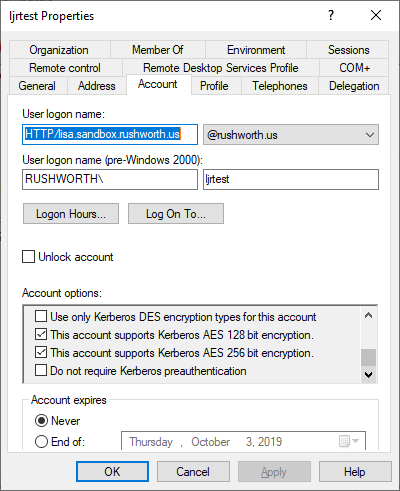Most of the application owners I encountered wanted someone online with them when they had to change their Kerberos service principal password. Not because I really needed to generate the keytab file, but “just in case”. A warm fuzzy feeling, good thoughts being sent their way. Whatever. I was up at dark-o-clock, so I’d generate the keytab the right way and we’d all be asleep in twenty minutes. What’s the wrong way? Well, in a stand-alone AD … that’s really just mapping the UPN to the wrong thing or failing to chose the encryption type wisely. But with AD accounts managed by an identify management platform and a notification package registered on the DCs to update said identity management platform when passwords were changed? I joined a lot of emergency calls either at 7AM following their keytab update or half an hour after the change completed. And 7AM was only because the app didn’t happen to have any 3rd shift users.
Keytab files have a key version number (kvno). Generate keytab and set the account password, you’ve got a file with KVNO version 5. Except IDM picks up the password change, tweaks up the managed accounts, and the actual AD object msDS-KeyVersionNumber is 6. And auth on your site falls over about half an hour after you complete your change (replication time!). So what’s the right way? Don’t make changes to the account. If you’re changing the password, change the password. And then generate a keytab.
I’ve created a sample account, ljrtest, used setspn to set an SPN value for my lisa.sandbox.rushworth.us site, and configured the account to support AES 128 and 256 bit encryption.
To generate a keytab file without updating the UPN or attempting to set the account password, use:
ktpass /out ljrtest.keytab /princ HTTP/lisa.sandbox.rushworth.us@rushworth.us -SetUPN /mapuser ljrtest /crypto AES256-SHA1 /ptype KRB5_NT_PRINCIPAL /pass DevNull -SetPass /target dc.rushworth.us
KTPASS is part of the RSAT utilities — on Win10 with the Oct 2018 update (or newer), this is now a “Feature on Demand” and can be added through “Apps & Features” by clicking “optional features” and selecting the ADS RSAT pack.
There are a few other utilities available — ktab from the JDK or ktutil on Linux — if you cannot install the RSAT pack.

Thank you for this excellent article It was very helpful and informative.